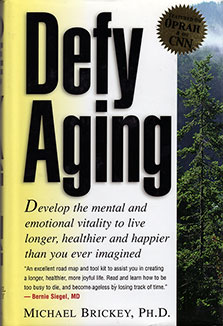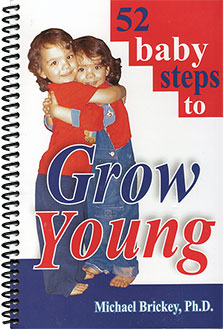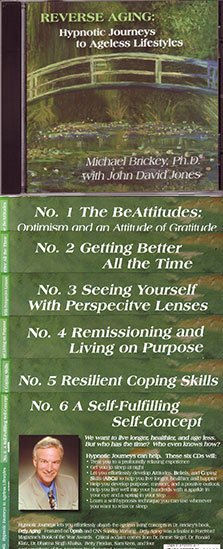The Defy Aging Newsletter
Anti-aging psychology, holistic health, and wellness
These are archives of a biweekly e-mail newsletter for helping you think, feel, look, and be more youthful and live with purpose.
October 8, 2009 Number 215
This issue:
Top Ten Social Perks of Being Over 50
Action to take
See these top ten perks as validation that life (usually) gets better with age.
Why
Remember the first time a birthday made you feel old? the jokes? the doubts? the fears your best days were behind you? Maybe you imagined someday wasting away in a nursing home. That’s when you got sucked into the script for thinking and feeling old. Our youth-obsessed culture promotes the idea that aging is all downhill. But I’m here to tell you that for most of us, life gets better as we age. Today I will depart from my usual format of interviewing an anti-aging expert and share with you my Top Ten Social Perks for Being Over 50.
The Top Ten Social Perks of Being Over Sixty©
by Michael Brickey, Ph.D., ABPP
1. Research finds1 that older people are happier
Research finds that older people report being happier than younger people. The percentages of Americans who said they were very happy were:
- 28% at ages 18-27
- 31% at 28-37
- 32% at 38-47
- 33% at 48-57
- 36% at 58-67
- 38% at 68-77

It drops to 34% for ages 78-89. Still, the 78-89 year old Americans are happier than people under 60. Why? Older people are more comfortable and secure with who they are, what their values are, and what they want to do with their lives. Research finds they focus more on positive events and less on negative events.
2. Less peer pressure
For most teens, especially girls, fitting in, being liked, and being popular are paramount issues. While seeing themselves as rebellious, teen culture is actually very conformist. Teens spend many hours worrying about the right clothes, the right music, and being hip. Age brings a clearer sense of identity and less importance on peer pressure. Employment requires being concerned about pleasing the boss, coworkers, and customers. When employment is no longer required for income, there is a new freedom from peer pressure.
3. More wisdom
Age brings experience and knowledge and learning from mistakes—our own mistakes and others’ mistakes. Living longer doesn’t guarantee wisdom, but it is a prerequisite.
4. More time
Rearing children takes a lot of time and energy. When they eventually leave home, it is eerie how quiet it becomes and how much more time there is. Retirement (or no longer having to work for the money) brings more discretionary time. It can be a time to pursue passions. It can be more time for friends and family. It can be more time to slow down, enjoy life more, think more, and smell the roses.
5. Better control of emotions
Research shows that age brings better skill at managing emotions and dealing with problems. Experience dealing with a lot of conflicts brings skills. In marital or long-term relationships, couples learn what to fight and what to accept. In short, age brings a larger, more tested repertoire for dealing with problems.
6. Better story tellers
Researchers had people listen to stories told by older people and younger people. They rated older peoples’ stories as more interesting, more informative, and of higher quality. This comes at a time in life when seniors are stepping up to being the family matriarchs and patriarchs and passing on family traditions, values, and stories. People tune out lectures. Stories, however, hypnotize listeners and slide in the message.
7. Sexuality doesn’t complicate relationships as much
Many seniors have a rich sex life and sexuality is important in their lives. Sexuality, however, becomes less about proving manhood or validating being desirable and loved, and more about warmth, caring, and sharing. Age brings fewer worries about political correctness and whether a hug or compliment will be considered a pass or sexual harassment. For couples, there is less fear of children overhearing or interrupting intimate moments and less fear of an unwanted pregnancy. Older men often become more emotionally involved in sex as they need more physical stimulation.
8. Better quality friendships
Youth is a time to experiment and try new things. It is a time to make friends with a wide variety of people. Experience teaches which friendships are likely to be rewarding and which friendships are likely to be superficial. With age, some friendships last for decades. Such friendships are indeed treasures. Research finds that older people have fewer causal acquaintances. They place more emphasis on family and close friends, are more satisfied with their relationships than younger people, and feel strong bonds to close friends. Many “prune” their friendships and make remarks like, “I don’t have time for those people.” There is a shift from novelty to quality, from popularity to meaning.
9. Pride in age again
Children proudly hold up fingers to tell their age and can’t wait until their next birthday. Each birthday was a big event. Adults in their thirties, forties, fifties, and sixties see age as eroding vitality and attractiveness and try to hide and deny their age. After sixty, age starts becoming something to be proud of and gives a sense of accomplishment and achievement. By ninety or 100 there are serious bragging rights.
10.Understanding the circle of life
The story of Peter Pan begins, “All of this has happened before, and all of it will happen again.” Age bears witness to cycles of birth, marriage, children and death; of hard times and easy times; of war and peace. Age brings an understanding of life’s rhythms and cycles. A great sense of satisfaction goes with this glimpse into the secrets of the universe.
Certainly a person can have sixty years of experience or one year of experience sixty times. Of course, not everyone over sixty experiences these perks. The perks cite generalities. Nevertheless, if you are a person who continues to grow with age, you are likely to experience these perks.
1. Chart based on Mroczek, Daniel, & Kolarz, Christian. The effect of age on positive and negative affect: A developmental perspective on happiness, Journal of Personality and SocialPsychology, 1998, 75, 1333-1348.Quotes
About the age of fifty, the elasticity of the mental process...as a rule are lacking. Old people are no longer educable.
~Sigmund Freud who wrote some of his best works after he was 65 and based his oedipal complex on Sophocles' Oedipus Rex, which Sophocles wrote when he was 71.
Humor
Have you ever been guilty of looking at others your own age and thinking, surely I can't look that old?
While waiting to see a new dentist, I noticed his diploma on the wall. On seeing his name, I remembered a tall, handsome, dark-haired boy in my high school class 30 years ago. Could he be the same guy that I had a secret crush on, way back then? When I saw him, however, I quickly discarded any such thought. This balding, gray-haired man with the deeply lined face was way too old to have been my classmate. I asked him if he had attended my high school. “Yes, yes, I did. I'm a Trojan,” he gleamed with pride. “When did you graduate? ”I asked. “1979. Why do you ask?” “You were in my class!” I exclaimed. “What did you teach? he asked.
Reprint this article from:
THE DEFY AGING NEWSLETTER
Anti-Aging Psychology
Holistic Health and Wellness
This newsletter article may be reprinted in E-zines, newsletters, newspapers, and magazines provided the content is not edited and the attribution below is given. Formatting may be changed and you may use one of the web site pictures of the author to accompany the article.
"Dr. Michael Brickey, The Anti-Aging Psychologist, teaches people to think, feel, look and be more youthful. He is an inspiring keynote speaker and Oprah-featured author. His works include: Defy Aging, 52 baby steps to Grow Young, and Reverse Aging (anti-aging hypnosis CDs). Visit www.NotAging.com for a free report on anti-aging secrets and a free newsletter with practical anti-aging tips."






